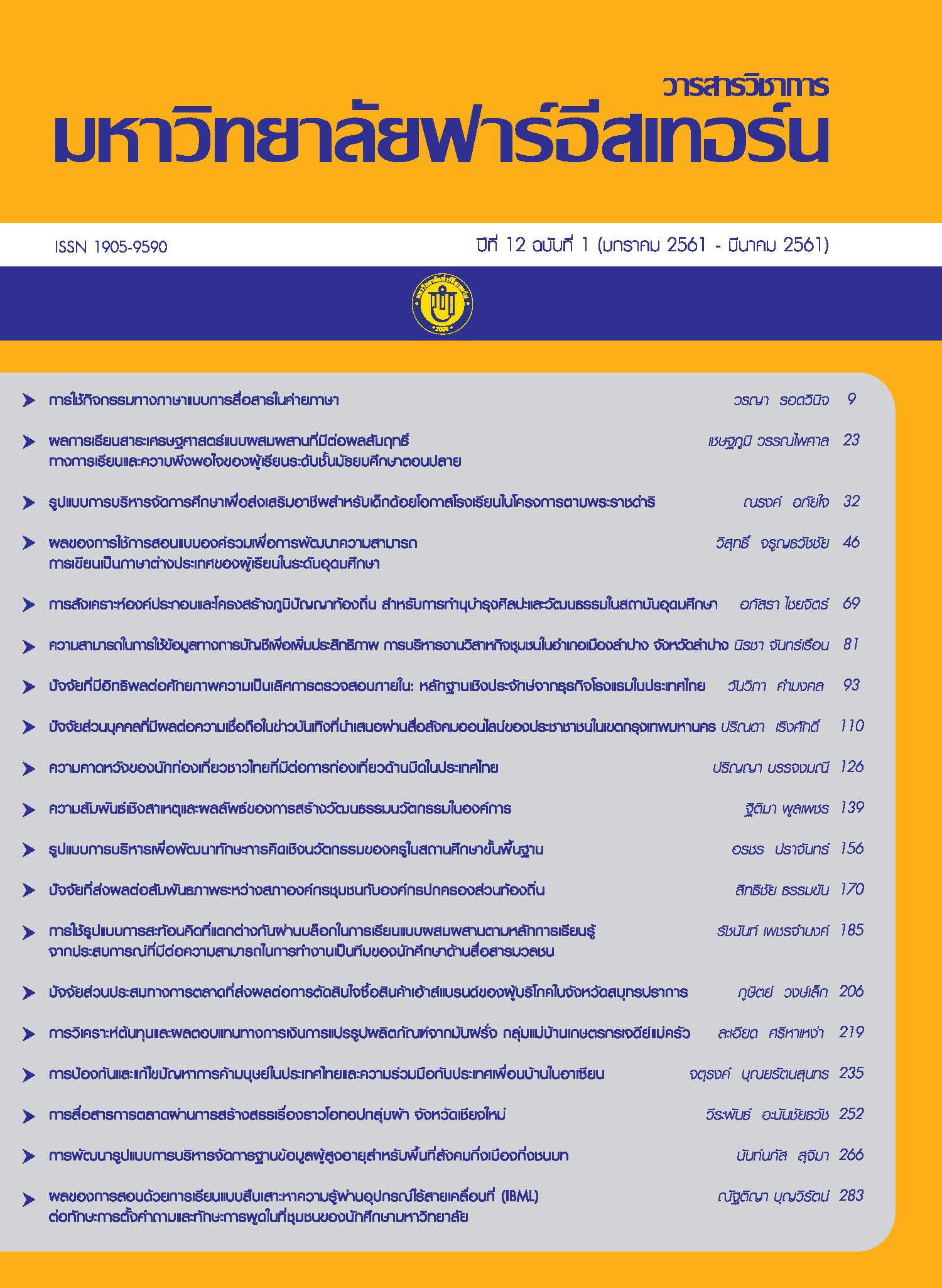ความสัมพันธ์เชิงสาเหตุและผลลัพธ์ของการสร้างวัฒนธรรมนวัตกรรมในองค์การ: หลักฐานเชิงประจักษ์ของโรงงานผลิตชิ้นส่วนอิเล็กทรอนิกส์ที่ได้รับสิทธิ BOI ในจังหวัดพระนครศรีอยุธยา
Main Article Content
Abstract
การวิจัยครั้งนี้มีวัตถุประสงค์เพื่อ 1) ทดสอบอิทธิพลการสร้างวัฒนธรรมนวัตกรรมในองค์การที่มีต่อ ปัจจัยผลลัพธ์ ได้แก่ความเป็นเลิศในการตลาดรูปแบบใหม่ การจัดการรูปแบบใหม่ 2) ทดสอบอิทธิพลความเป็นเลิศในการตลาดรูปแบบใหม่ และการจัดการรูปแบบใหม่ ที่มีต่อผลดำเนินงานขององค์การ และ 3) ทดสอบอิทธิพลของปัจจัยเชิงสาเหตุ ได้แก่ การบริหารการเปลี่ยนแปลง โครงสร้างองค์การแบบมีชีวิต และการสร้างสรรค์ระบบการจัดการทรัพยากรมนุษย์ ที่มีต่อการสร้างวัฒนธรรมนวัตกรรมในองค์การประชากรและกลุ่มตัวอย่างของโรงงานผลิตชิ้นส่วนอิเล็กทรอนิกส์ที่ได้รับสิทธิ BOI ในจังหวัดพระนครศรีอยุธยาจำนวน 554 โรงงานเก็บรวบรวมข้อมูลโดยใช้แบบสอบถาม สถิติการวิเคราะห์ข้อมูลได้แก่ การวิเคราะห์องค์ประกอบเชิงยืนยันพบว่าโมเดลตามสมมติฐานมีความสอดคล้องกลมกลืนกับข้อมูลเชิงประจักษ์นั้นผ่านเกณฑ์
ผลการวิเคราะห์โมเดลตามวัตถุประสงค์การวิจัย พบว่า 1)การสร้างวัฒนธรรมนวัตกรรมมีผลกระทบทางตรงต่อความเป็นเลิศในการตลาดรูปแบบใหม่ และการจัดการรูปแบบใหม่2)ความเป็นเลิศในการตลาดรูปแบบใหม่ และการจัดการรูปแบบใหม่ มีผลกระทบทางตรงต่อผลดำเนินงานขององค์การ3)การบริหารการเปลี่ยนแปลง โครงสร้างองค์การแบบมีชีวิต และการสร้างสรรค์ระบบการจัดการทรัพยากรมนุษย์ มีผลกระทบทางตรงต่อการสร้างวัฒนธรรมนวัตกรรม
The research aimed to 1) investigate innovative cultural construction in organization effect to new approach of marketing excellence and new marketing excellence , 2) investigate new approach of marketing excellence and new marketing excellence effect to organization performance and 3) investigate antecedent factors which are change management organic organization and creativity of human resource management system effect to innovative cultural construction. Population and sample of of electronics part factories of BOI Promoted phranakornsriayudaya provinces 554 factories. The questionnaire which was used as the tools for data collection.Data were analysis of Confirmatory Factor Analaysis (CFA). The research results showed that the model base on assumption were in harmony with the empirical data.
The results of research aimed that 1) innovative cultural construction has a direct effect on new approach of marketing excellence and new marketing excellence.2) new approach of marketing excellence and new marketing excellence has a direct effect on organization performance. 3) change management organic organization and creativity of human resource management system have a direct effect on innovative cultural construction.
Article Details
1. Any views and comments in the Journal of Social Innovation and Lifelong Learning are the authors’ views. The editorial staff have not to agree with those views and it is not considered as the editorial’s responsibility.
2. The responsibility of content and draft check of each article belongs to each author. In case, there is any lawsuit about copyright infringement. It is considered as the authors’ sole responsibility.
3. The article copyright belonging to the authors and The Far Eastern University are copyrighted legally. Republication must be received direct permission from the authors and The Far Eastern University in written form.
References
สำนักคณะกรรมการส่งเสริมการลงทุน. (2559). สถิติการลงทุน. สืบค้นเมื่อวันที่ 03 มกราคม 2560, จาก http://www.boi.go.th/index.php?page=Report_investment.
Acquaah, M. & Agyapong, A. (2015). The Relationship between Competitive Strategy and Firm Performance in Micro and Small Businesses in Ghana: The Moderating Role of Managerial and Marketing Capabilities. Africa Journal of Manaagement. 1(2), 172-193.
Ahmed, P. K. (1988). Culture and climate for innovation. European Journal of Innovation Management. 1(1), 30-34.
Christiansen, J. A. (2000). Competitive innovation management: Techniques to improve innovation performance. New York: St. Martin.
De Clercq, D. ; Dimov, D. & Thongpapanl, N. T. (2010). The moderating impact of internal social exchange processes on the entrepreneurial orientation–performance relationship. Journal of Business Venturing. 25(1), 87–103.
Deshpande, R. (2012). Organizational change: a perception regarding change management among the employees and workers in private sector organizations in Gujarat state. International Journal of New Innovations. 1(2), 300-303.
Devika, N. & Sharifah Latifah Syed A, K. (2016). Measuring Business Process Management using business process orientation and process improvement initiatives. Business Process Management Journal. 22(6), 1069-1078.
Diamantopoulos, A. & Siguaw, A. D. (2000). Introducing LISREL: a guide for the uninitiated. London: Sage Publications.
Dobni, B. C. (2008). Measuring Innovation Culture in Organization the Development of a Generalized Innovation Culture Construct Using Exploratory Factor Analysis. European Journal of Innovation Management. 11(4), 539-559.
Jackson, D. L. (2001). Sample Size and Number of Parameter Estimates in Maximum Likelihood Confirmatory Factor Analysis: A Monte Carlo Investigation. Structural Equation Modeling A Multidisciplinary Journal. 8(2), 205-223.
Johnston, R. E. & Bate, J. D. (2013). The Power of Strategy Innovation: A New Way of Linking Creativity and Strategic Planning to Discover Great Business Opportunities. New York: Amacom.
Natalia, M. & Cristina, O. (2016). The effects of the crisis on marketing innovation: an application for Spain. Journal of Business & Industrial Marketing. 31(3), 404-417.
Ngo, H. Y. & Loi, R. (2008). Human resource flexibility organizational culture and firm performance: investigation of multinational firms in Hongkong. International Journal of Human resource Management. 19(9), 1654-1666.
Prajogo, D. & Mcdermott, C. M. (2014). Antecedents of service innovation in SMEs: comparing the effects of external and internal factors. Journal of Small Business Management. 52(3), 521-540.
Prakash, Y. & Meenakshi, G. (2008). Exploring the Relationship Between Organisation Structure and Perceived Innovation in the Manufacturing Sector in India. Singapore Management Review. 1(30), 55-76.
Shyh-Rong, F. ; Enchi, C. & Chueh-Chu, O. (2014). Internal market orientation market capabilities and learning orientation. European Journal of Marketing. 48 (1), 170-192.
Stock, R. M. ; Six, B. & Zacharias, N. A. (2013). Linking multiple layers of innovation-oriented corporate culture, product program innovativeness and business performance: a contingency approach. Journal of the Academy of Marketing Science. 41(3), 283-299.
Uzkurt, C. ; Kumar, R. ; Kimzan, H.S. & Eminoglu, G. (2013), Role of innovation in the relationship between organizational culture Management. European Journal of Innovation Management. 16(1), 92-117.

